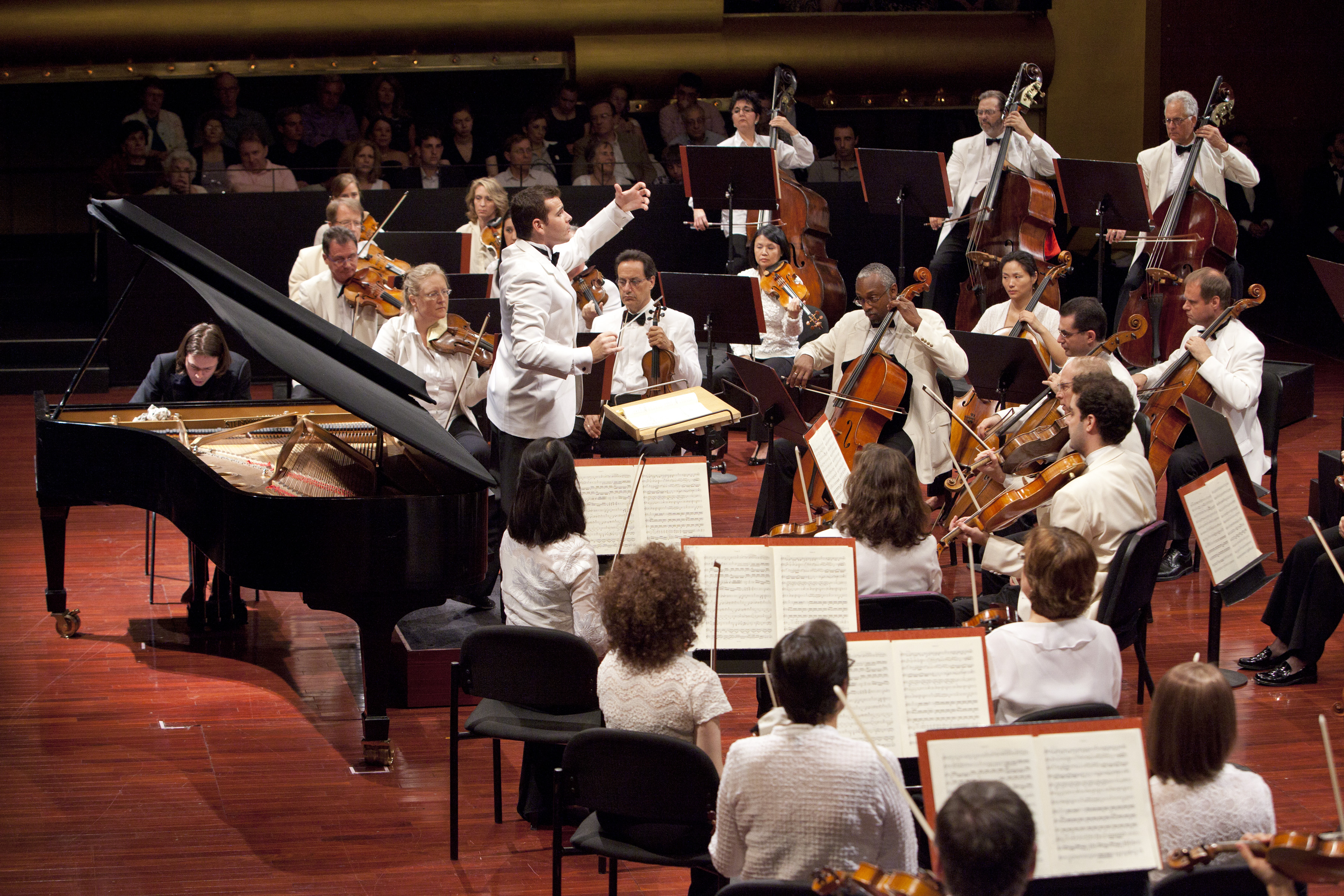Mostly Mozart Festival
Mostly Mozart Festival Mostly Mozart Festival Orchestra Lionel Bringuier, conductor David Fray, piano Avery Fisher Hall, New York, NY August 6, 2010
Mostly Mozart Festival Orchestra-Lionel Bringuier, conductor-David Fray, piano - Photo Credit Richard Termine
This was one of the Festival’s All-Mozart programs: the Overture to “Cosi fan tutte” K.588, the Piano Concerto in E-flat major, No. 22, K.482, and the “Prague” Symphony, No. 38, K. 504. As it often does, the Festival presented two very young guests, both from France: conductor Lionel Bringuier and pianist David Fray in his Mostly Mozart debut.
The program’s opening and closing works were bright and spirited, though each started with a slow, solemn Introduction. The opera “Cosi fan tutte” is considered a comedy, but its humor is laced with sarcasm and leavened with ambivalence and regret. The Overture heralds these conflicting emotions. The Introduction alternates orchestral chords with an oboe solo so plaintive that the arrival of the Overture’s fast main part almost comes as a surprise. In the Symphony, too, the Introduction, the longest and perhaps most dramatic in all Mozart’s symphonies, generates a sense of such dark foreboding that the sudden shift from D minor to D major is quite disconcerting. The Symphony is unusual in having only three movements: two fast, sprightly ones framing a lovely Andante.
E-flat major seems to have been Mozart’s favorite tonality for his most mellow, lyrical music. Among his Piano Concertos, No. 22 is one of the most heavenly. The scoring for a full complement of winds gives it a rich, warm sound. Its emotional depth is immediately established in the orchestral Introduction; the piano then takes up and embellishes the themes. The second movement, variations in C minor, is a heart-breaking lament, and the final Rondo, like many others in that key, is a merry hunting song. But Mozart has a surprise in store: its central episode is virtually another slow movement, presenting entirely new, ravishingly lovely material in a stately, back-and-forth conversation between the soloist and the woodwind “Harmonie” section, who played absolutely beautifully.
David Fray, though still in his twenties, is the recipient of an extraordinary number of performing and recording awards, and has played in practically every great European concert hall. He made his American debut with the Cleveland Orchestra in 2009, and has also appeared with the orchestras of Boston, San Francisco, New York and Los Angeles. His performance at this concert was most excellent, without fuss, show, or exaggeration; his technique is always at the service of the music and so effortless that one forgets about it; his tone can be both delicate and sonorous; his expressiveness is concentrated and deeply felt.
The Festival Orchestra is in splendid form. The players not only sound good under every conductor, they are undaunted by their maestros’ sometimes exorbitant demands. On this occasion, Lionel Bringuier – who, at the age of 23, seems to have been everywhere and done everything in the conducting world – drove them beyond all reasonable speed-limits. He took the Overture at a tempo that made clear articulation and phrasing impossible; in the Symphony’s corner movements, musical and expressive details were lost in the head-long rush. If this sounds much like the report on the previous concert, that is not surprising: it sometimes seems as if many of today’s young conductors (and young instrumentalists too, for that matter) are determined to outdo one another in setting new speed-records. Surely even in the jet-age there is more to music than playing as fast as possible.
